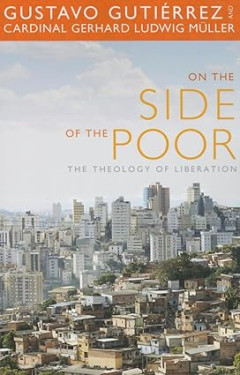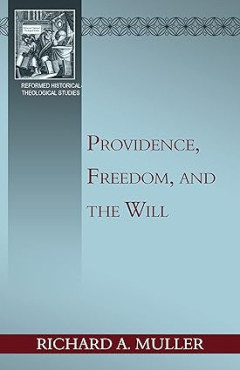Ditapis dengan

On The Side of the Poor : The Theology of Liberation
Outline : For many years the theology of liberation, which emerged from Latin America in the 1970s, was viewed with suspicion and even hostility in Rome. In this historic exchange, Father Gustavo Gutiérrez, one of the original architects of liberation theology, and Cardinal Gerhard Müller, current Prefect of the Congregation for the Doctrine of the Faith, offer a new and positive chapter. Car…
- Edisi
- -
- ISBN/ISSN
- 978-1-62698-115-7
- Deskripsi Fisik
- 144 hal
- Judul Seri
- -
- No. Panggil
- 230\'.0464 G9851o

Reformed Historical Theology : Volume 80 : Richard Hooker, the Rule of Faith,…
Outline : Nigel Voak examines the genesis and evolution of religious evidentialism in England from 1585 to 1700, a deeply influential epistemology which claims that religious beliefs are only justified to the extent that we have evidence to substantiate them, and that we have an obligation to proportion our assent to the strength of our evidence. Given the propositions of faith lack the evident…
- Edisi
- -
- ISBN/ISSN
- 978-3-525-50207-5
- Deskripsi Fisik
- 443 hal
- Judul Seri
- -
- No. Panggil
- R 230.4 R259r v.80

Providence, Freedom, and the Will in early Modern Reformed Theology
Outline : Too often scholars impose on the past modern terms and theories. This is particularly evident concerning discussions of divine sovereignty and human responsibility, where libertarian and compatibilist notions of freedom obscure older understandings of concurrence. Providence, Freedom, and the Will is one historian’s attempt to help us interpret early modern documents in context with…
- Edisi
- -
- ISBN/ISSN
- 9781601789136
- Deskripsi Fisik
- 285 hal
- Judul Seri
- Reformed Historical-Theological Studies
- No. Panggil
- 230\'.42 M912p

HISTORICAL AND THEOLOGICAL STUDIES ARMINIUS AND THE REFORMED TRADITION
One of the questions fairly consistently raised by modern studies of Arminius's thought is the question of his relationship to the Reformed tradition and, specifically, to Dutch Reformed theology. To pose the question succinctly, was Arminius Reformed? The answer is quite complex. Arminius certainly understood himself as Reformed—and his appointment both to the pastorate in Amsterdam and to t…
- Edisi
- WTJ 70 (2008): 19-48
- ISBN/ISSN
- -
- Deskripsi Fisik
- 31 p.
- Judul Seri
- -
- No. Panggil
- online

Post-Reformation Reformed Dogmatics: Prolegomena to Theology, Volume 1
The monograph waited and, in fact, was placed on a "back burner" while I revised the dissertation for publication as Christ and the Decree and wrote a Dictionary of Latin and Greek Theological Terms, Drawn Principally from Protestant Scholastic Theology. When I returned to the project, my bibliography had expanded and my thoughts on the subject had elaborated considerably.
- Edisi
- First
- ISBN/ISSN
- 0801062144
- Deskripsi Fisik
- 372 p. ; 23 cm
- Judul Seri
- -
- No. Panggil
- -

The Providence of God Regarding the Universe: part three of the first princip…
God's providence over the world posed a traditional set of questions for the medieval philosopher-theologian. In the third part of his first principal part of The Universe of Creatures, William of Auvergne argues that God's providence over creation extends to all things, the lowest as well as the highest. He tackles problems, such as pain, suffering, and other evils and faces questions, such as…
- Edisi
- First
- ISBN/ISSN
- 9780874622461
- Deskripsi Fisik
- 204 p.
- Judul Seri
- Medieval Philosophical Texts in Translation
- No. Panggil
- online

Heinrich Bullinger and the Doctrine of Predestination
- Edisi
- -
- ISBN/ISSN
- 0-8010-2605-9
- Deskripsi Fisik
- 137 hal
- Judul Seri
- Texts & Studies in Reformation & Post-Reformation Thought
- No. Panggil
- 234\'.9\'092 V554h
- Edisi
- -
- ISBN/ISSN
- 0-8010-2605-9
- Deskripsi Fisik
- 137 hal
- Judul Seri
- Texts & Studies in Reformation & Post-Reformation Thought
- No. Panggil
- 234\'.9\'092 V554h

Sedjarah Geredja di Indonesia
- Edisi
- Second Edition
- ISBN/ISSN
- -
- Deskripsi Fisik
- 290
- Judul Seri
- -
- No. Panggil
- 275.98 K942s
- Edisi
- Second Edition
- ISBN/ISSN
- -
- Deskripsi Fisik
- 290
- Judul Seri
- -
- No. Panggil
- 275.98 K942s

Missionary Methods : St. Paul's or Ours?
Outline: Since his death in 1947, the writings of missionary Roland Allen have remained in constat demand. When Allen's careful analysis in Missionary Methods first appeared 82 years ago, it made a startling impression. And as Allen himself predicted, the true depth of his writings only began to be fully probed fifty years later. Profoundly biblical, Allen's "methods" are drawn from a scrupulou…
- Edisi
- -
- ISBN/ISSN
- 0-8028-1001-2
- Deskripsi Fisik
- 179
- Judul Seri
- -
- No. Panggil
- 226 A15m c.3

Missionary Methods : St. Paul's or ours?
Outline: Since his death in 1947, the writings of missionary Roland Allen, have remained in constant of demand. When Allen's careful analysis in Missionary Methods first appeared 82 years ago, it made a strartling impression. And as Allen himself predicted, the true depth of his writings only began to be fully probed fifty years later. Profoundly biblical, Allen's "methods" are drawn from a scr…
- Edisi
- Sixth Edition
- ISBN/ISSN
- 0-8028-1001-2
- Deskripsi Fisik
- 179 hal
- Judul Seri
- -
- No. Panggil
- 226 Al15m

Honor & Shame : Unlocking the Door
Outline: In this book, Rolland Muller removes the mystique from shame-based cultures. Using the Bible, he introduces us to honor, shame, and fear-based cultures, illustrating their development over the years and demonstrating their influence on our understanding of the gospel message. Muller goes on to illustrate how the 10/40window is made up almost exclusively of shame-based cultures. He then…
- Edisi
- -
- ISBN/ISSN
- 9780738843164
- Deskripsi Fisik
- 124 hal
- Judul Seri
- -
- No. Panggil
- 266.0088297 M912h

Messenger, The Message, The Community, The : Three Critical Issues for the Cr…
Outline: Most cross-cultural church-planting ministries face three critical issues. First, church planters must be accepted as valid messengers. They must be people with credibility that can speak clearly into their listeners' situation. Second, their message must be understandable. Muller explains that everyone has a worldview built from three basic building blocks found in Genesis 3: shame, g…
- Edisi
- -
- ISBN/ISSN
- 0-9733642-1-1
- Deskripsi Fisik
- 393
- Judul Seri
- -
- No. Panggil
- 266 M9582m c.1

Spontaneous Expansion of the Church, The : and the Causes which hinder it
- Edisi
- First Edition
- ISBN/ISSN
- -
- Deskripsi Fisik
- 170
- Judul Seri
- -
- No. Panggil
- 266 A4251s c.1
- Edisi
- First Edition
- ISBN/ISSN
- -
- Deskripsi Fisik
- 170
- Judul Seri
- -
- No. Panggil
- 266 A4251s c.1

Built upon the Rock : Studies in the Gospel of Matthew
- Edisi
- First Edition
- ISBN/ISSN
- 978-0-8028-4563-4
- Deskripsi Fisik
- 331
- Judul Seri
- -
- No. Panggil
- 226.206 G9817b c.1
- Edisi
- First Edition
- ISBN/ISSN
- 978-0-8028-4563-4
- Deskripsi Fisik
- 331
- Judul Seri
- -
- No. Panggil
- 226.206 G9817b c.1

Religious Pluralism and Religious Freedom : Religions, Society and the State …
Outline: In an environment of increasing religious pluralism, the State's responsibility for the protection of equal religious freedom for all is gaining in importance. Yet the more religion tends to assert a public role, the more the State must be able to count on the recognition by religions themselves of religious pluralism and religious freedom also for others. This requires an opening o…
- Edisi
- -
- ISBN/ISSN
- 978-602-17781-3-5
- Deskripsi Fisik
- 221
- Judul Seri
- -
- No. Panggil
- 201.5 H1831r

Calvin Theological Journal : Volume 35, 2000
Calvin Theological Journal Volume 35, 2000 consists of: 1. Volume 35, Number 1, April 2000; 2. Volume 35, Number 2, November 2000.
- Edisi
- -
- ISBN/ISSN
- 0008-1795
- Deskripsi Fisik
- 412
- Judul Seri
- Calvin Theological Journal
- No. Panggil
- R 050 Jou C139c v.35

Divine Will and Human Choice : Freedom, Contingency, and Necessity in Early M…
- Edisi
- First Edition
- ISBN/ISSN
- 978-0-8010-3085-7
- Deskripsi Fisik
- 329
- Judul Seri
- -
- No. Panggil
- 233 Muld
- Edisi
- First Edition
- ISBN/ISSN
- 978-0-8010-3085-7
- Deskripsi Fisik
- 329
- Judul Seri
- -
- No. Panggil
- 233 Muld

Oxford Handbook of Early Modern Theology, 1600 - 1800, The
Outline: This book offers a comprehensive and authoritative introduction to Christian theological writing in Western Europe from, roughly, the end of the French Wars of Religion (1598) to the Congress of Vienna (1815). Over the course of more than forty wide-ranging essays, employing a variety of approaches, the authors examine theology from Bellarmine to Johann Semler. They review the major …
- Edisi
- First Edition
- ISBN/ISSN
- 978-0-19-993794-3
- Deskripsi Fisik
- 668
- Judul Seri
- -
- No. Panggil
- 230.09 L528o

Dari Benih Terkecil, Tumbuh Menjadi Pohon : Kisah Anton dan Alida van de Loos…
- Edisi
- -
- ISBN/ISSN
- 9799975506
- Deskripsi Fisik
- 270
- Judul Seri
- -
- No. Panggil
- 266 L87d
- Edisi
- -
- ISBN/ISSN
- 9799975506
- Deskripsi Fisik
- 270
- Judul Seri
- -
- No. Panggil
- 266 L87d

Biblical Interpretation and Doctrinal Formulation in the Reformed Tradition. …
Overview: The Reformed tradition is characterized by a rigorous commitment to theological formulation, yet it is equally known for its commitment for rooting its life and practice in the authority of God's Word. While these two commitments are commonly acknowledged, the path from biblical interpretation to doctrinal formulation is often overlooked. Examining a diverse group of thinkers across…
- Edisi
- -
- ISBN/ISSN
- 978-1-60178-286-1
- Deskripsi Fisik
- 338
- Judul Seri
- -
- No. Panggil
- 230'.42 L49b

Du Meine Seele, du mein Herz : 50 Sololieder fur feierliche Anlasse von Hochz…
- Edisi
- -
- ISBN/ISSN
- 979-0-014-11025-3
- Deskripsi Fisik
- 175
- Judul Seri
- Edition Peters EP 11202b
- No. Panggil
- R 784.2 Er19dm
- Edisi
- -
- ISBN/ISSN
- 979-0-014-11025-3
- Deskripsi Fisik
- 175
- Judul Seri
- Edition Peters EP 11202b
- No. Panggil
- R 784.2 Er19dm

Du meine Seele, du mein Herz : 50 Sololieder fur feierliche Anlasse von Hochz…
- Edisi
- -
- ISBN/ISSN
- 9-790014-110246
- Deskripsi Fisik
- 175
- Judul Seri
- Edition Peters EP 11202a
- No. Panggil
- R 784.2 Er19dh
- Edisi
- -
- ISBN/ISSN
- 9-790014-110246
- Deskripsi Fisik
- 175
- Judul Seri
- Edition Peters EP 11202a
- No. Panggil
- R 784.2 Er19dh

Calvin and the Reformed Tradition : On the Work of Christ and the Order of Sa…
"Richard Muller, a world-class scholar of the Reformation era, examines the relationship of Calvin's theology to the Reformed tradition, indicating Calvin's place in the tradition as one of several significant second-generation formulators. Muller argues that the Reformed tradition is a diverse and variegated movement not suitably described either as founded solely on the thought of John Calvin…
- Edisi
- -
- ISBN/ISSN
- 9780801048708
- Deskripsi Fisik
- 288
- Judul Seri
- -
- No. Panggil
- 232 M91c
 Karya Umum
Karya Umum  Filsafat
Filsafat  Agama
Agama  Ilmu-ilmu Sosial
Ilmu-ilmu Sosial  Bahasa
Bahasa  Ilmu-ilmu Murni
Ilmu-ilmu Murni  Ilmu-ilmu Terapan
Ilmu-ilmu Terapan  Kesenian, Hiburan, dan Olahraga
Kesenian, Hiburan, dan Olahraga  Kesusastraan
Kesusastraan  Geografi dan Sejarah
Geografi dan Sejarah